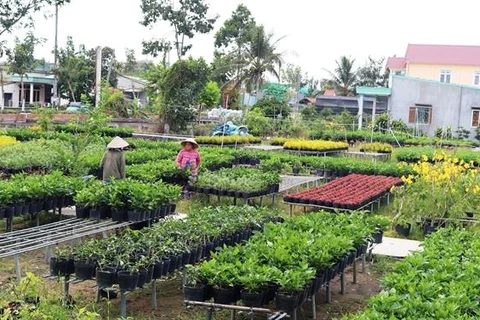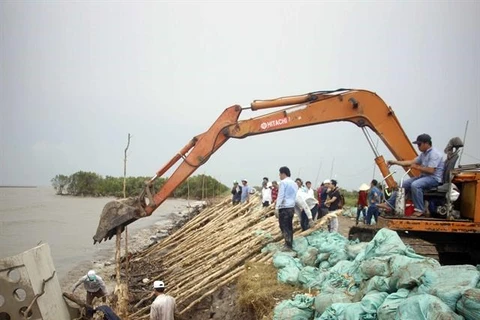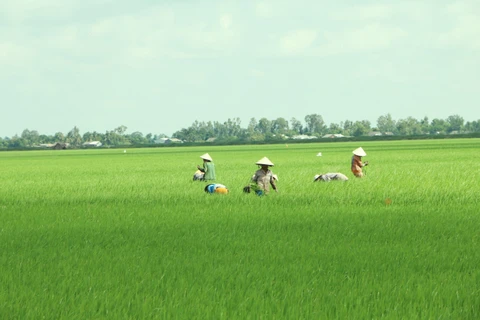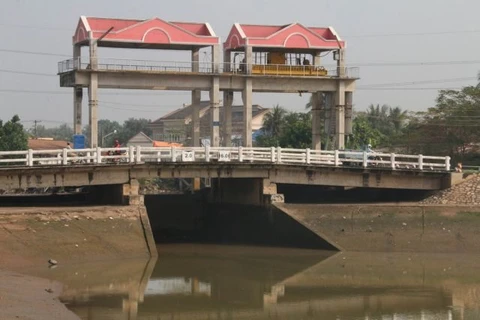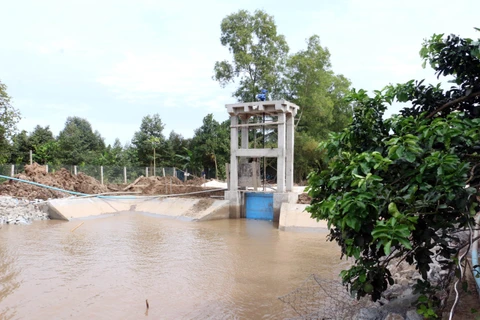 Deputy Prime Minister Trinh Dinh Dung (centre) speaks at the conference seeking ways to deal with saltwater intrusion on January 3 (Photo: VNA)
Deputy Prime Minister Trinh Dinh Dung (centre) speaks at the conference seeking ways to deal with saltwater intrusion on January 3 (Photo: VNA) Ben Tre (VNA) – A conference was held in Ben Tre province on January 3 to discuss measures for coping with drought and saltwater intrusion which are getting more serious in the Mekong Delta this dry season.
Minister of Agriculture and Rural Development Nguyen Xuan Cuong said saltwater intrusion in the 2019-2020 dry season has appeared earlier than in the 2015-2016 dry season, when the historic drought and saline intrusion caused huge losses to the Mekong Delta – the largest agricultural production hub of Vietnam. The situation is forecast to continue getting more serious, severely affecting local agricultural production and people’s lives.
Notably, the 2019 rainy season in the Mekong River basin came later than normal, with lower water flow than the average. As a result, water flow to the Mekong Delta, comprising 12 provinces and one centrally-run city, since the beginning of this dry season has fallen sharply, standing at a very low level compared to the average.
Director General of the ministry’s Directorate of Water Resources Nguyen Van Tinh said since January 1, the water level on the Mekong River measured at the Kratie station of Cambodia has been almost 2.33m lower than the average and 0.77m lower than that in the same period in 2015.
Meanwhile, the amount of water in Cambodia’s Tonle Sap Lake at present is about 15.7 billion cu.m. lower than the average of the 2010-2018 period and nearly 340 million cu.m. lower than in the same period of the 2015-2016 dry season.
From January to February, the water flow measured at the Kratie station is predicted to be 35 percent lower than the average, and the water amount in Tonle Sap Lake will remain low, unable to supply water for downstream areas in Vietnam.
The agriculture ministry reported the Mekong Delta has sown rice seeds on more than 1.5 million ha for the 2019-2020 winter-spring crop, and irrigation solutions are needed to ensure water for about 332,000ha of the area in case of prolonged saltwater intrusion, mostly in Long An, Tien Giang, Tra Vinh, Soc Trang, Bac Lieu, Ca Mau, Hau Giang and Kien Giang.
Apart from agriculture, drought and saltwater intrusion have also led to water shortage for about 82,000 households in the region, mainly in Ben Tre, Soc Trang, Kien Giang, Ca Mau and Tien Giang. The number of affected households is likely to reach 158,000 in the time ahead, according to localities’ reports.
Hoang Duc Cuong, Deputy Director General of the Meteorological and Hydrological Administration under the Ministry of Natural Resources and Environment, said drought and saline intrusion are projected to influence the same area as in the 2015-2016 dry season with 10 of the 13 provincial-level localities under impact.
At the conference, Deputy Prime Minister Trinh Dinh Dung said effective solutions are necessary to deal with drought and saltwater intrusion in both short and long terms.
He asked the Ministry of Agriculture and Rural Development to coordinate with the localities to carry out effective countermeasures. They must ensure water supply for people’s lives and agriculture and prevent epidemics caused by water shortage.
The Deputy PM also requested them to keep a close watch on the weather and water sources in the Mekong Delta and upstream areas, devise water supply plans, allocate funding for anti-drought solutions, reinforce embankments, and actively store fresh water. In the long term, the localities should install automatic salinity monitoring devices and perfect irrigation systems to control tidal surges and saltwater intrusion.
Dung also asked the Ministry of Natural Resources and Environment to coordinate with relevant agencies to work with countries in the upper Mekong River to collect information about the water situation and operations of hydropower reservoirs, and propose the neighbours increase releasing water from their reservoirs to help the Vietnamese delta to push back saltwater when necessary./.
VNA
